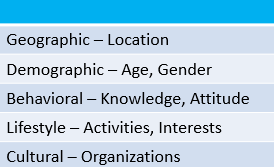There are many benefits to advertising in Boston and other large cities around the world. However, it is not a cut-and-dry tactic. For various companies, marketing in Boston requires a heightened focus on market segmentation.
Segmentation is typically defined by splitting up your target market into categories often based on some of the following factors:

One of the main advantages for various companies advertising in Boston is the ability to target a large and diverse population with your campaign. Boston is the largest city in New England with around 650,000 people, while the U.S. Census Bureau estimates 4.7 million people in the entire Greater Boston Area.
While the diversity of Boston is what makes marketing there beneficial, it also makes it more complicated. It’s often necessary to break down the segments into specific categories, usually based on more than one of the basic factors listed in the graphic above. The recent census has shown how diverse Boston has been becoming recently:
- 63.2% of the population currently identifying with some minority group
- 57.1% of the 49,667 firms that are located in Boston are minority-owned.
- 26.5% of Boston residents are foreign born
- 35.8% speak a language other than English at home
Clearly, marketing both B2C and B2B in Boston takes a great knowledge about how to market to distinct segments.
Example Campaign Analysis
Let’s say we are advertising for a client offering financial planning services and are located in a downtown Boston building. We have 30-second video ads appear in the 20-mile radius surrounding our location, using geographic targeting. We know that 35 percent of people in this area prefer their messages to be in a language other than English; that one fact alone could therefore potentially waste close to 35 percent of your ad budget. Filtering out the non-English speakers, or targeting them with messages in their own language, could reduce this waste.
Moreover, not everyone in Boston meets the description of your ideal client, so setting a specific filter such as household income will further narrow the broad segment down even more.
Thinning out your segment to just your ideal customers without over-defining your reach–thus making it too small– is conceivable because of Boston’s large population. The plan is beneficial because reducing advertising budget waste is a critical part of ROI-driven marketing. Here at Davis, refined market segmentation is one of the key tactics we use to reduce budget waste. To do so, we use the most cutting-edge platforms and distribution networks to make all our channels perform at the segmentation level that should be expected in this day and age.
